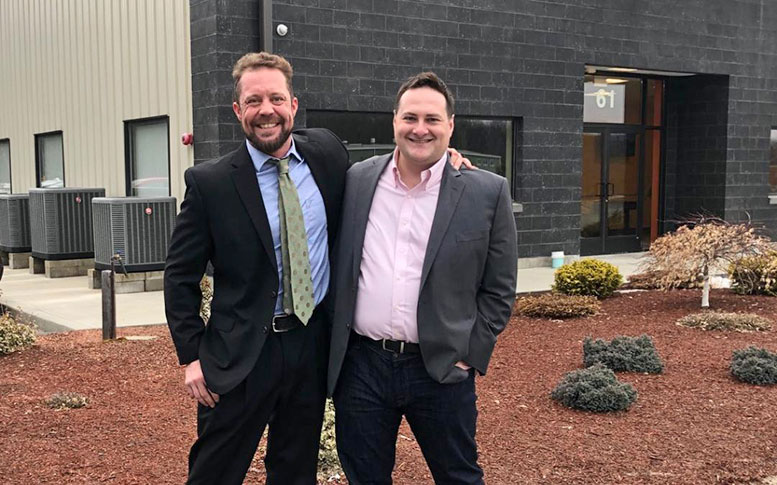LGBTQ Entrepreneurs Share Victories And Battles With a System/process That Some Allege Works Differently for Some and Not Others
By: Mike Givens/TRT Assistant Editor—
In this two-part series, The Rainbow Times explores the experiences of several LGBTQ entrepreneurs seeking to build successful cannabis businesses in the Bay State. This series will explore the varying stages the business owners are at in the application process and their hopes for the future.
Have a conversation with Jordan Grossman about cannabis and he can share a solemn story of hope, dedication, investment, and ultimately, loss, all stemming from a dream to be an openly-gay business owner in the marijuana industry.
“I saw [an] immense opportunity in what would be the very first recreational cannabis market on the east coast,” said the 27-year-old in an e-mail interview with The Rainbow Times.
Grossman said that in January of 2019 he and his two business partners submitted an application to become a licensed cannabis microbusiness in Massachusetts, a venture called Nor’Easter Remedies based in Leicester. He estimates that the venture cost roughly a quarter of a million dollars.
“My biggest source of confidence was the state’s vision of a diverse market with built-in avenues for small businesses,” he continued. “It seemed like Massachusetts was going to get it right where other states had gone wrong, and we would have a fighting chance as an LGBTQ- and Asian-American-owned small business.”
However, by the summer of 2019, Grossman said his business was suffering, hemorrhaging money while waiting for the state’s regulatory agency, the Cannabis Control Commission (CCC), to approve its application. The business partners had to front thousands of dollars in expenses such as attorneys, rent, and other fees to establish a viable business prior to receiving a license to operate.
“We were glad to receive word in September from the CCC that our application had been reviewed and only required minor changes in order to be deemed ‘complete,’” Grossman said, which gave him and his business partners a “cautious optimism.”
“Once a business’s application is deemed ‘complete,’ the laws and regulations state that the CCC has a maximum of 90 days to either grant or deny a license,” he added. “In addition to minor edits on our operations and diversity plans, we also needed to create an escrow account with $5,000 for the CCC,” he said. “By the time we got the edits back, we were at the end of our funds because of renting the facility for over a year. [We] were not able to submit again.
“It does not matter to the commission if an applicant is pouring rent money into an empty facility for one, two, or even three years like some other small business applicants have.”
By mid-January, Grossman and his partners were forced to shut down their business, a decision he described as “heartbreaking.”
Question 4
In the early 1900s, Massachusetts reportedly became the first state in the nation to criminalize recreational cannabis use.
Nearly a century later in November 2008, the Bay State decriminalized possession of small amounts of cannabis through a ballot initiative. The law changed so that possession of less than an ounce of cannabis would result in a $100 fine and the offender would not have the offense reported to the state criminal history board.
Four years later, another ballot initiative saw more than 60 percent of Mass. voters support the decriminalization of possession of small amounts of cannabis for medicinal purposes. January 1, 2013, began the implementation of a new law forbidding criminal and civil penalties for possession as long as the person in question held a valid Massachusetts Medical Marijuana card. Medical conditions like cancer provide a valid reason to purchase the card.
By 2016, there was another push for the complete decriminalization of cannabis, another ballot initiative known as Question 4.
Massachusetts Governor Charlie Baker was, “in bipartisan opposition to legalizing a recreational marketplace for a drug that would put our children at risk and threaten to reverse our progress combating the growing opioid epidemic so this industry can rake in millions in profits,” according to a statement released to The Boston Globe in April 2016.
Baker partnered with Boston Mayor Marty Walsh and Speaker of the House Robert DeLeo in animated opposition to fully legalizing the recreational use of cannabis. Massachusetts Attorney General Maura Healey echoed similar sentiments. The politicians were adamant that cannabis could serve as a “gateway” into more harmful drugs such as opioids.
Despite high-profile opposition to Question 4, a strong pro-legalization movement mobilized and educated Massachusetts’ voters on what a cannabis-friendly Bay State could look like.
By November of that year, the ballot question passed with nearly 54 percent of the vote. As of January 1, 11 states and the District of Columbia have legalized recreational cannabis sales and usage across the nation. Maine, Massachusetts, and Vermont are the only three New England states with legislation legalizing recreational cannabis use.
The Process
According to the CCC’s website, there are eight types of categories available to a business owner interested in cultivating, manufacturing, or selling cannabis, a few of which include “Marijuana Retailer,” “Marijuana Cultivator,” and “Marijuana Transporter.”
Grossman applied for a “Marijuana Microbusiness” license.
“The microbusiness license category was originally developed by the state to increase license accessibility for small, locally-owned cannabis businesses,” he said. “Microbusinesses are limited to the smallest cultivation and manufacturing restraints and do not have retail abilities. With modest ambitions, compared to the rest of the players in this industry, we felt the microbusiness license was an ideal fit for our vision of a craft cannabis grow operation.”
The CCC has divided its application process into three “packets.” By the fall of 2019, two more categories were added to the list of available business licenses, including a “Social Consumption Pilot Program,” which authorizes 12 cities and towns in Massachusetts to open a facility where adults 21 and older could use cannabis on site.
Before this process is even started, a host-community agreement (HCA), a legal contract between the business owner and a city or town agreeing to host the business, must be signed. Roughly half of Massachusetts’ cities and towns have banned the recreational sale of cannabis.
While Grossman was able to secure a property in central Massachusetts, other business owners have struggled. Cannabis entrepreneurs have, in several instances, accused city and town officials of making unrealistic demands in order to secure an agreement. State law mandates that an HCA can last no longer than five years and up to three percent of a cannabis business’s gross revenue can be paid to the city or town as a fee. The CCC does not have the authority to review or enforce HCAs.
Just a little over 50 miles south of Boston, the city of Fall River found itself at the center of controversy last year when it came to light that the city asked several cannabis businesses to pay four percent of their gross revenue, violating the three percent cap. Former Mayor Jasiel Correia II, already facing multiple federal charges for fraud stemming from a 2018 arrest, was charged on September 6 with extortion. According to the charges, Correia demanded payment in exchange for agreements for four businesses to set up shop in Fall River. He currently faces more than 20 federal charges related to his 2018 and 2019 arrests; 11 of the charges stem from the extortion allegations.
On February 5, An Act Relative to Host Community Agreements was passed in the House of Representatives. This bill more stringently regulates the terms of HCAs and reaffirms the three percent cap.
“Without the authority under state law to review host community agreements (HCAs), the Commission currently does not collect HCAs from licensees,” a Commission spokesperson said in an e-mail interview with The Rainbow Times. “License applicants are required to submit a form that certifies an HCA has been reached with a municipality as part of their license application. Since the Commission has approved 309 provisional licenses in total, at least 309 HCAs are currently in existence with communities throughout Massachusetts.”
However, the existence of more than 300 HCAs in Massachusetts does not mean there are a corresponding number of cannabis businesses across the commonwealth as HCAs are a requirement to enter the application process, but do not guarantee a final license.
Once the CCC receives a final and completed application, the host community will be contacted and has 60 days to confirm that the applicant is abiding by necessary local and state laws in running its business.
Part one of the application process involves submitting an application of intent providing key information about the business owner and how the business is organized and funded.
The second “packet” requires a thorough background check. This process can require the submission of a Criminal Offender Record Information (CORI) form, which documents the criminal history of an individual in the state of Massachusetts. The CCC also requires an applicant’s fingerprints be obtained as well as a full narrative around any criminal or civil cases the applicant was involved in.
The final part of the process is a management and operations profile, a series of documents proving the applicant understands how to operate a business. Successful submission of the packet demonstrates that the applicant has an understanding of Massachusetts law and the CCC’s regulations. This packet also requires a plan on how the applicant will train employees and a lengthy outline of policies and procedures the applicant will abide by to ensure compliance.
All three packets submitted at once are considered to be a “full” application.
The CCC has 90 days from when it deems the application “complete” and fully approved to approve or deny a provisional license to the applicant. A provisional license means that the applicant will be scheduled for an architectural review and physical inspection of their business space. If both the review and inspection are passed, the business owner may be granted a one-year license.
As of February, of the 309 provisional licenses issued by the CCC, 115 of them have been transitioned to final, one-year licenses, according to the CCC’s spokesperson.
Commission’s Composition
The CCC is overseen by five commissioners tasked with administering the laws associated with the legalization of medicinal and adult-use cannabis.
However, the Commission isn’t without criticism.
Jim Borghesani, a vocal supporter of 2016’s Question 4 and a spokesperson for the “Yes on 4” campaign, vehemently protested the composition of the commission in a September 2017 article published by The Springfield Republican.
“The Cannabis Control Commission does not reflect the Massachusetts electorate,” he said of the commissioners chosen to lead the CCC.
Reportedly, four of the five commissioners did not vote “Yes” on Question 4, the sole commissioner who did being Shaleen Title, a Massachusetts-based attorney who fills the commission’s social justice seat. Chairman Steven Hoffman, a businessman; Kay Doyle, a former attorney for the Massachusetts Department of Public Health; Senator Jennifer Flanagan; and former Assistant Attorney General Britte McBride also serve as commissioners.

Ture Turnbull and his business partner Wes Ritchie stand in front of their cannabis retail business, New England Craft Cultivators, in Dracut; Photo: Ture Turnbull and Wes Ritchie
From the State House to the State’s Herb
Wes Ritchie and Ture Turnbull met more than a decade ago while working at the State House. Being two openly-LGBTQ men in the State House helped them build a friendship that lasted as both went in separate career directions.
What brought them back together as colleagues was a vision of entering a new market in the commonwealth and branding themselves as an LGBTQ+-owned business.
“Two things made my business partner, Ture, and I decide to go into the cannabis industry—first, we knew that we didn’t want big, corporate owners to dominate the industry,” Ritchie, 34, said in an e-mail to The Rainbow Times. “Our stores are going to be run by us and we’re going to be partnering with other small companies to bring the best quality products to market.
“Second, it’s so unusual for a new industry to emerge. As a duo that has worked in city and state government for years, we were attracted to the opportunity to build a business in a new and emerging market. We want to take the skills and values we’ve honed elsewhere and apply them to this new industry.”
The pair has secured HCAs with the towns of Pepperell and Dracut and has identified a location in Boston’s Dorchester neighborhood for their retail shop, New England Craft Cultivators. They’re about to submit their application to the CCC and hope to open the Pepperell and Dracut stores in 2020.
Ritchie said that he and Turnbull, 38, have a desire to, “grow a business while helping our community.” The business partners say that they want to brand themselves as a “gay weed” operation.
“Our vision has been to open the first loud and proud LGBTQ+-owned cannabis dispensaries in Massachusetts and to make sure we’re engaged with and giving back to nonprofits that support the community,” he continued.
In a follow-up phone interview with The Rainbow Times, Ritchie said that he wants their future LGBTQ+ patrons to see themselves in the three retail stores they hope to open.
“We care about having our shops labeled as LGBTQ stores because we think people care about where they shop and want to shop at LGBTQ-owned stores.”
While Grossman has experienced frustration with the CCC, Ritchie and Turnbull are just beginning the process of working with the state agency as they have spent the last year finalizing the HCAs, filling out the paperwork, and preparing to submit their application.
“For us, the CCC has been accessible,” Ritchie said. “The way the CCC has released public information and responded to public concerns has demonstrated their commitment to getting this industry set up right. The challenges that they’re dealing with are enormous and we’ve found them responsive.”
“You’re just running [a marathon] and you have no idea where the finish line is.”
In her Boston neighborhood of Roxbury, she’s known as the “Crazy Green Lady.”
Leah, 51, got her nickname as her neighbors consistently received impromptu lectures on the importance of energy conservation, compliance, weatherization insulation, and other ways they could live “green” lives, save money, and help the environment.
Two years ago, she decided that she wanted to bring a retail cannabis business to her predominantly black community.
“I dived into this industry with the same vigor and willingness to bring this to a community I know,” she said.
She and her partner, Jacinth “Jaye” Cooke Daniels, 31, another budding entrepreneur, set out to create their own cannabis retail business, Alchemy League. Leah estimates that she submitted her full application in the summer of 2018.
Jaye, the owner of a laundry pickup and delivery service, has a strong interest in cooking and decided that her contribution to Alchemy League would be exploring the niche market of cannabis and food, a project she calls Weed a La Carte.
But the road to cannabis business ownership, particularly for the couple, who celebrated their second anniversary in February, has been a difficult one and their experience with the CCC has been more akin to that of Grossman, rather than Ritchie.
“It’s sad, ridiculous, convoluted, non-transparent … I could go on and on with my vernacular around this hideous process,” said Leah of her efforts to receive a final license from the CCC.
In a phone interview with The Rainbow Times, Leah made a series of allegations against the agency.
“The people that were assigned to actually apply and create this process weren’t people that even believed in the plant itself anyway, were not supportive of Question 4 and were completely opposed to it,” Leah alleged of the composition of the leadership of the commission. When you put the fox over the hen house and you expect the roosters and chickens to play … forget about it!”
Leah said that she owns several state licenses and that none of them have been as difficult to get as her cannabis retail license.
“Imagine if while you were in barbering school you had to pay for tuition, pay for your building, pay for [electricity], pay for the equipment you will need, and not know ever if you can even become a barber,” she said, noting that cannabis business owners are required to spend thousands of dollars on equipment, rent, lawyers, consultants, materials, and staff, but are not guaranteed a final license.
Leah reflected that while her experience procuring an HCA with the city of Holyoke in western Massachusetts was an easy process, liaising with the CCC, completing an application, and waiting for a provisional license has been akin to, “doing a dance.”
Leah said she often experienced a lack of understanding as to how to navigate the application process, its associated fees, and was severely disappointed with an alleged lack of communication from the CCC.
“You’re just running [a marathon] and you have no idea where the finish line is,” Jaye said.
“They’ve made this process in a way in which only the rich … should have gotten through this process, or should be able to get through this process,” Leah said.
Both women firmly believe that the amount of money and time that goes into procuring all of the assets one needs to successfully complete an application, receive a provisional license, and finally receive a one-year license to sell, are exorbitant. According to the pair, the resources of time and hundreds of thousands of dollars to pay for consultants, attorneys, architects, real estate fees, rent, application fees, and other expenses are more easily available for large corporate firms with lots of revenue and staff.
Leah said that she’s spent about $375,000 during the application process and about $1 million in what she calls “sweat equity,” or the mental, emotional, and physical labor put into getting a business off the ground.
Large corporate companies have, in fact, opened up businesses in the state. For example, on January 29, Curaleaf opened up the first retail cannabis business on Cape Cod. The business, headquartered in Wakefield, owns dispensaries and cultivation sites in several states across the country. Its 2019 revenue was $223 million, a more than 200 percent increase than reported revenue of $77 million in 2018. Projections estimate that Curaleaf, active in 11 of the 12 most lucrative cannabis markets, could see a revenue of $1 billion in 2020.
Grossman said he believes that big businesses from all over are descending upon Massachusetts to take advantage of the cannabis trade.
“The conclusion I have drawn from all of this is if a company has an abundance of capital to pay for monthly expenses during an immeasurable licensing period, they will succeed in this industry,” he said. “And who has that amount of capital? The answer is out-of-state … companies with access to hundreds of millions of dollars, who have aggressively invaded Massachusetts and who control most of what was supposed to be a thriving and diverse market of smaller local businesses.”
In its business guidance documents, the CCC mandates that “a ‘controlling person’ is defined as an officer, board member, or another individual who has a financial or voting interest of 10 percent or greater in a Marijuana Establishment” and “No individual or entity may be a controlling person over more than three licenses for a particular class of license.” This rule means that a business cannot own or control more than three cannabis businesses in the state.
New York-based Acreage Holdings faced scrutiny over accusations that it violated this rule. The firm has been accused of having a “controlling interest” in two small cannabis companies in Massachusetts. With Acreage Holdings already owning three cannabis shops in Massachusetts through its Botanist franchise, the controlling interests were reportedly perceived to be co-ownership of the companies already operated by the two smaller businesses. The contracts administering the agreements have been deemed “inoperable” by Acreage Holdings after a recent CCC investigation.
TILT Holdings, a multi-million dollar firm based in Boston, has also faced accusations of violating the “three-license” rule. TILT owns a medical dispensary in Taunton and has public plans to open recreational businesses in the commonwealth. Oregon-based Elev8 sought last year to open three retail shops in Athol, Orange, and Williamstown. Through an investigation conducted by the CCC, it was discovered that TILT and Elev8 were contractually involved, and TILT potentially had a controlling interest or partial ownership of the Elev8 facilities.
When questioned about these large corporate businesses and their alleged violations, the CCC spokesperson referred The Rainbow Times to a memo detailing an investigation into Acreage Holdings and another memo detailing its investigation into TILT Holdings and Elev8.
“Because the Massachusetts cannabis laws require that no operator own more than three retail stores, they’ve investigated these companies who basically end up having ownership through really severe operating agreements,” said Ritchie, an attorney and former chief of staff for former State Senator Barbara L’Italien, after reviewing the memos. “Ultimately, it appears that the CCC found that Elev8 was acting in good-faith and provided all documentation to the CCC and that there was no wrongdoing, and that the agreement between TILT and Elev8 did not constitute control of Elev8’s operations by TILT Holdings. The CCC is making major efforts to make sure the spirit of the ownership laws is not circumvented.”
Ritchie shared his opinion that the CCC’s investigations illustrate the agency’s dedication to fairness.
“Overall, both cases taken together point to how important to the CCC it is that companies, especially big national cannabis companies like Acreage and TILT, not have effective control over the operators in Massachusetts,” he said. “Essentially they say, ‘Sure, you can loan these guys money. Sure, you can enter into an agreement with these guys to carry your products, but you can’t tie one to the other and basically create a situation where the companies end up working for and being beholden to these big companies.’”
In response to a direct question from The Rainbow Times around the purported high costs associated with the licensing process, the CCC noted its, “eliminating a specific capital requirement for any Marijuana Establishment applicant” interested in applying for a license. The spokesperson also referenced the CCC’s elimination of fees for economic empowerment and social equity applicants.
“ … one of those minority people again … ”
The economic empowerment application track was developed by the CCC in response to 2017’s An Act to Ensure Safe Access to Marijuana, which affirms, “that people from communities that have been disproportionately harmed by marijuana law enforcement are included in the new legal marijuana industry.”
Certain populations such as blacks and Latinxs, disproportionately impacted by criminal cannabis laws, were positioned to receive priority application review for cannabis business licenses in Massachusetts as a way to ensure equity in the application process.
To qualify for the economic empowerment track, an applicant must demonstrate three of six criteria. Key to the criteria is the definition of an “area of disproportionate impact,” cities of 100,000 or more that have experienced high arrest rates for cannabis possession. There are 29 of these areas in Massachusetts, including Brockton, Chelsea, Fall River, Holyoke, Lowell, New Bedford, and Worcester. Boston is also in this category and its neighborhoods, along with the neighborhoods of several other cities, have been broken down to show where the most arrests have occurred and are therefore also considered disproportionate impact areas.
The six criteria are: a majority of owners having lived in an area of disproportionate impact for five of the last 10 years; a majority of owners having worked in an area of disproportionate impact in a role that served the area’s primary population; at least 51 percent of employees or subcontractors of a cannabis business live in an area of disproportionate impact and will increase to 75 percent by the first day the business opens; at least 51 percent of employees or subcontractors of a cannabis business have a drug-related CORI, but are still legally eligible to work in the cannabis industry; a majority of ownership is composed of people of black, African American, Latino or Hispanic descent; and business owners can show a track record of past business practice that promoted economic empowerment in an area of disproportionate impact.
Leah and Jaye qualified for the economic empowerment track, based on meeting several of these criteria, but say that applying for a CCC business license didn’t serve their best interest.
“All that did was put the biggest target on everybody’s back in the world,” Leah exclaimed.
Rather than actually empowering people of color in areas of disproportionate impact, Leah asserts that the economic empowerment track is nothing more than a way to exclude certain undesirable applicants.
“So now when your application comes up, it’s ‘Oh, that’s one of those minority people again … them poor people again … one of them black gay people again … one of them lesbian, dykes, [or] fags again,” she said. “Who knows what they’re saying.
“They’re hoping that all of those applicants who look like me, you, gay, black, poor, fat, Irish, immigrant, whatever they’re contemplating, do not represent the 53 percent of the population of the state of Massachusetts who voted ‘Yes.’”
In August 2018, The Springfield Republican published a piece highlighting the plight of minority business owners who were struggling through the licensure process as economic empowerment applicants.
Similar to Leah and Jaye, those business owners also struggled with the high upfront costs of establishing a business and competition with wealthy companies seeking to open businesses nearby.
The City of Cambridge is currently embroiled in a debate over a two-year “head start” period designed to give economic empowerment applicants priority when establishing businesses. The policy would have banned retail cannabis sales in Cambridge to anyone but economic empowerment applicants until September 2021. The ban caused a kerfuffle with owners of medical dispensaries upset over the fact that they would not be able to open retail stores in Cambridge for two years. Recently, a judge placed an injunction against the Cambridge policy designed to help minority business owners. Cambridge city officials, who don’t feel that the injunction is fair or necessary, are strategizing around the next steps to support economic empowerment applicants.
The commission also mentioned that unique to the Bay State, the application process requires every applicant to submit a diversity plan and positive impact plan. The diversity plan’s purpose is to, “promote equity among minorities, women, veterans, people with disabilities, and people of all gender identities and sexual orientation.”
With regard to the application, the spokesperson clarified how the process works once an application is submitted.
“Requests for Information (RFIs) are sent to license applicants once the Commission has reviewed all required packets submitted by an applicant and determines information is not clear, contradictory of other parts of the application, not compliant with the Commission’s regulations, or incomplete,” the spokesperson said. “Applicants may need to modify or resubmit parts of their application or provide additional clarification when their response to an RFI is provided to the Commission. The Commission may issue supplemental RFIs when needed. If an Economic Empowerment Applicant resubmits their application after an RFI, if they are a priority applicant, they again receive priority review.”
The spokesperson confirmed that, as of February 27, final applications have been submitted as economic empowerment applicants out of a total of 122 certified applicants to the program. Earlier this month, Pure Oasis of Boston, became the first licensed cannabis business in Massachusetts certified through the economic empowerment program.
Akin to the economic empowerment track, there is the social equity application track, developed specifically for business owners directly impacted by cannabis laws. That track requires that the applicant has lived in an area of disproportionate impact for five of the last 10 years; or has a previous drug conviction and has lived in Massachusetts for the last year; or has been married to or is the child of a person with a previous drug conviction and has lived in Massachusetts for the last year.
Successful social equity applicants are also eligible for services related to identifying sources of capital, managerial and employee training, and legal compliance guidance, among others.
In Uxbridge, Caroline’s Cannabis currently operates as a social equity applicant.
LGBTQ+ Provisions
There is currently no language in either the economic empowerment or social equity tracks that provides specific provisions around LGBTQ+-identified people. Certified businesses owned by veterans and women as well as minority business enterprises, outdoor cultivators, craft cooperatives, and microbusinesses are also given priority review status.
“We went to the CCC early on when we started this business to see if there [was] any help for [an] LGBTQ-owned business like ours and we realized that there was no LGBTQ classification,” Ritchie said.
Ritchie said that he’s impressed with the Cooke Daniels’ advocacy efforts on behalf of their business.
“We have so much respect for Leah Daniels, who as a woman of color, lesbian and leader, has basically thrown herself in front of the media spotlight to stand up for her business and try to get her retail shop opened in Holyoke as she’s faced a challenging licensing process,” he said, referring to a December Boston Globe article detailing Leah’s interruptions of both a December and January CCC meeting.
Leah’s frustration erupted at both meetings over waiting more than 600 days for clarity about whether her application was approved and, if not, why the commission was not providing details about how to complete it.
“She’s a damn inspiration, and she’s been struggling through the licensing process for about two years,” Ritchie continued. “The truth about the industry is that it’s dominated by straight, white, cisgender folks. That’s where the access to capital is in our society, and so far, despite a lot of great advocacy, the Massachusetts cannabis industry reflects that.”
By February, the Cooke Daniels received their provisional license, but according to Leah, this is just the start of their journey into the cannabis industry.
“You don’t get a license; you get an opportunity to do business in the industry … after you’ve spent $300,000 to $500,000” she said.
***
In part two of this series, learn more about the Cooke Daniels’ hopes now that they have a provisional license; Wes Ritchie and Ture Turnbull’s progress in finalizing their application; and how Jordan Grossman is recovering from the devastation of his failed business venture. Also, The Rainbow Times will introduce our readers to other LGBTQ+ entrepreneurs seeking to start their own cannabis business and learn how the CCC is optimizing its application process.







